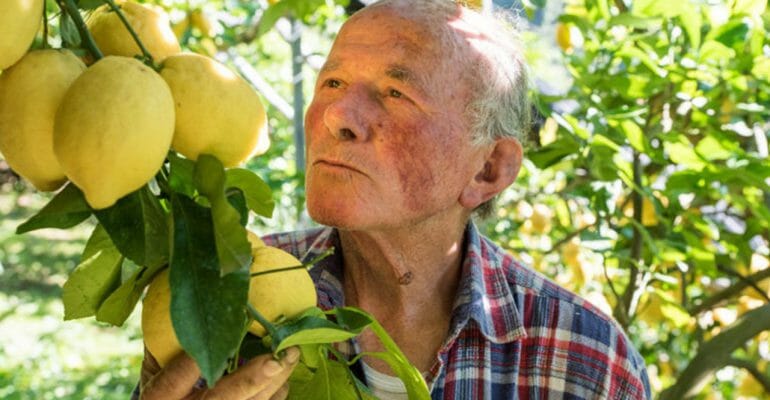THE FLYING LEMON FARMERS
August 23, 2022 2023-09-18 21:21THE FLYING LEMON FARMERS
The Amalfi Coast, a UNESCO World Heritage Site in Southern Italy, is home to a unique breed of large lemons found nowhere else in the world. Amalfi Lemons, also known as “sfusati amalfitan,” are light yellow in color, large, fragrant, and have a sweet and sour flavor. The sweetness of this lemon’s skin makes it easier to eat with a knife, just like an apple.
The Amalfi Coast region has a Mediterranean climate, a steep coastline, and little farming space. The lemons are grown along the Tyrrhenian Sea between Naples and the Gulf of Salerno. Because of the coastal city’s location, the roots of the lemon tree keep the land from washing away into the sea.
The adjective “Flying” that describes Lemon farmers comes from the farmers’ activities. The “sfusati amalfitan” farmers are mostly elderly men in their 80s and above who have decided to preserve their slowly fading tradition. These men are not deterred by their age or gravity, as they can be seen balancing on high wooden poles among the branches of lemon trees, pruning the trees, harvesting giant lemons, and laying them in crates to be transported to where they will be sold, each crates weighing approximately 25 kilograms. These elderly men understand that, in addition to preserving the tradition, the root of the plant holds the Amalfi Coast lines together and prevents landslides. Most of these farmers live on the farm, where they sleep in the grooves, eat lemons, and use them as medicine because they contain vitamins C, B, E, potassium, and magnesium. They are used as sanitizers after a cut, and they are used to treat headaches by adding a little lemon peel to coffee first thing in the morning. They are also used for cleaning by the locals.
Using their traditional agricultural method of farming, these Flying farmers have implemented various measures to ensure the success of the plants both in season and out of season. Every effort is well thought out, and these maintenances are done collectively, from the arrangements of the plants in layers to the creation of spaces between plants with the use of walls made out of their local limestone that can withstand pressure from the soil and rain, to the formidable terracing system that helps direct rainwater to irrigate the plants.
Despite the efforts of these dedicated farmers, there are some forces against which they must contend in order to keep the traditional farming of these beautiful lemons from becoming extinct. One of these forces is the force of civilization; there are better and easier ways to farm nowadays, but flying farmers still prefer the traditional way of farming, which is very difficult; this makes the process unappealing to younger generations who would prefer an easier farming method, and this situation serves as a threat to their tradition.
When compared to modernized farming methods, traditional farming is also more expensive to maintain. The profit from lemon sales is small in comparison to the cost of maintenance.
To address these issues, the Amalfi farmers established tourism on their property, which was spearheaded by Salvatore and his brothers, who are also farmers, and was dubbed Lemon tours. This allows tourists to visit the farm and learn about the uses and significance of this unique lemon. This act raises funds for farmers while also exposing tourists to a very special type of lemon.
If life gives you lemons, make lemonade, but for this type of lemon, the farmer’s hard work has already made the lemonade for you.
Sources
https://goodness-exchange.com/amalfi-coast-lemon-amazing/
https://edition.cnn.com/travel/article/climate-change-lemon-farming-amalfi/index.html
 |
Author : Amiakhor Beatrice Ejaeta |
























